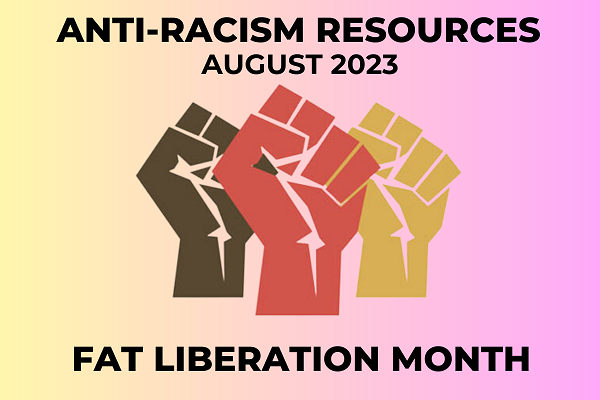2023 Dr. Paul Ernsberger Research Scholarship Winners
Compiled by Darliene Howell, NAAFA Administrative Director
NAAFA is delighted to introduce our 2023 Dr. Paul Ernsberger Research Scholarship winners! During this scholarship period, NAAFA received several applications for consideration. Many thanks to our reviewers: Dr. Richard Koletsky, Cathy Niswonger, RN, BSN, and NAAFA Board Member, Elaine Lee, JD!
Samantha Turner
You may recognize Samantha as our 2022 Ernsberger Scholarship recipient. Samantha was considered this year for a second scholarship award to allow her to be able to present her research findings to a variety of upcoming medical conferences.
Samantha has been a PhD Candidate at University of Massachusetts Tan Chingfen Graduate School of Nursing and defended her dissertation in June of this year. She will be graduating on August 31, 2023.
Here is an update on Samantha’s work.
“My study reached target recruitment in April. My initial target sample size was 85 participants, and I far exceeded this at 177 participants. I am in the process of submitting a manuscript for review to Academic Pediatrics, a peer-reviewed journal. The major findings of my study include that pediatric healthcare professionals' level of implicit bias shows a steady increase as they spend more time in practice, and that inpatient professionals showed the highest level of implicit bias. Pediatric healthcare professionals broadly believe that weight bias exists in healthcare, and support taking action to reduce weight stigma. Those with greater weight bias are less likely to want to take action, indicating that greater awareness of the consequences of weight stigma is needed. Healthcare professionals widely support the development of continuing education units (CEUs), as well as expressed support for anti-weight-based-bullying policies in schools. The next step of this work will be to disseminate the findings at conferences and in publication in a journal.”
The scholarship reviewers all enthusiastically recommended Samantha for a second scholarship.
Sarah Sullivan
Sarah has shared the following information about herself and her work with us.
“I am a doctoral student entering into my second year at the University of Denver’s Graduate School of Social Work. I am a straight-sized, queer, neurodivergent, white, genderqueer woman (she/they) with a love for fun shoes, dancing, and social justice-oriented research! I work alongside my mentor, Dr. Erin Harrop, to study participants’ experiences of weight stigma interventions and their efficacy for people in various populations.
My research: I am currently working with a team led by medical students at the University of Michigan to implement and study an intervention designed to address weight bias and promote weight inclusive care for medical students. We plan to compare pre-intervention, post-intervention, and 6-month follow-up scores regarding fat attitudes and internalized weight bias. Participants will share about their individual experiences in the intervention through open-ended questions as well. We hope that this research will expand knowledge on weight stigma interventions so that they may be more widely implemented, especially for future health practitioners. Disrupting weight stigma in medicine is a vital step in battling the oppression experienced by fat folks and promoting fat acceptance throughout society.”
The scholarship reviewers all enthusiastically recommended Sarah for a scholarship.
Natalie Hussain
Natalie is currently enrolled in Collin County Community College in Texas. Although Natalie does not qualify for the full 2023 Dr. Paul Ernsberger Research Scholarship as she is not currently enrolled in a graduate program, the evaluators thought that her commitment to body liberation at this early stage in her academic career is commendable. One of the evaluators recommended a "seed starter" award of $500 to further encourage the direction in which she is heading is appropriate. The Board of Directors agreed and approved a one-time undergraduate award.
Here is how Natalie described how her research will carry on Dr. Ernsberger's legacy and further fat liberation:
“As a child, my curiosity for the natural world sparked an interest in biology. However, it was a personal encounter with body dysmorphia that ultimately solidified my decision to pursue a career in the field. My pediatrician at the time dismissed my concerns, and I endured the consequences of this neglect until I sought the help of a different doctor. This experience instilled in me a profound appreciation for the importance of attentive and empathetic care for children, and motivated me to become a pediatrician to prevent others from enduring a similar ordeal. Biology was a natural choice for me as it forms the foundation of medicine, and through my coursework and research, I have gained a deeper understanding of the complexities of the human body. My experience with body dysmorphia has given me a unique perspective on the significance of compassionate care, particularly with regards to mental health. It is my aim to establish a secure and supportive space for children and their families to feel acknowledged and valued. The potential benefits of early intervention and treatment in the lives of young people are significant, and I aspire to play a role in this change.
My commitment to identifying and addressing physician bias stems from a deep understanding of its complexity and the significant harm it can cause marginalized individuals. In pursuit of equitable healthcare practices for all patients, I aim to employ biological research to investigate the physiological factors that contribute to weight bias and the impact of physician bias on patient outcomes, thereby furthering Dr. Ernsberger's legacy of fat liberation. My research approach will include utilizing a range of quantitative and qualitative research methods, such as data collection and analysis, pattern identification and trend analysis, and conducting patient interviews and surveys. Through this approach, I seek to provide evidence-based solutions that can help mitigate the harmful effects of physician bias and promote equitable healthcare practices that prioritize the health and well-being of all patients, irrespective of their body size or shape. In summary, my commitment to pursuing scientific research concerning physician bias is driven by a desire to promote equitable healthcare practices and make meaningful contributions towards achieving fat liberation.”









